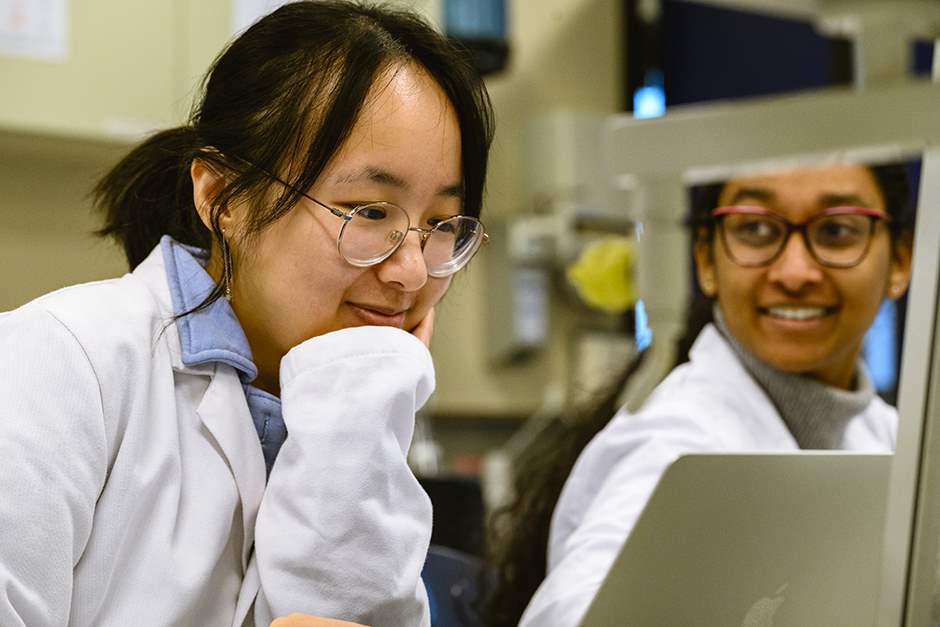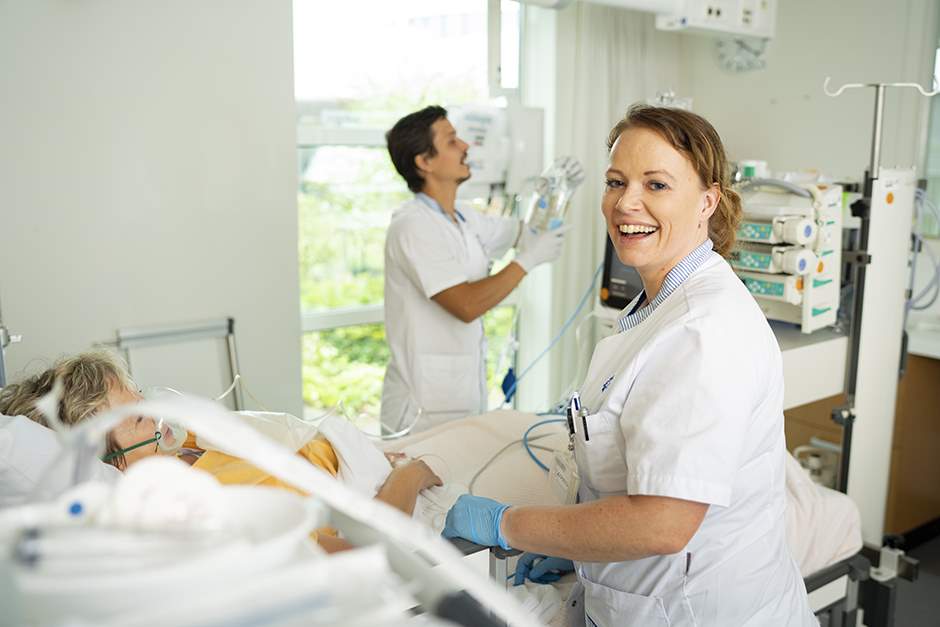Governance: our impact on fair and reliable learning practices
How education can be improved, cannot only be decided by the top management at UMC Utrecht. Students are experience experts and have unique ideas and opinions, and a unique view of the impact that choices can have. But how do we listen to our students when we make important choices and decisions for our education?

Students cooperate actively in all stages of the remodeling of our courses. In 2024 we worked on a curriculum revision of our Medicine , Biomedical Sciences, and Clinical Health Sciences programs. We looked at the setup of the curriculum, the content, and the learning targets of the course.
We always start by asking input from our students. Students also participate in various working groups on the substantial elaboration of the new curriculum. In focus groups, students and lecturers think about where and how we can still improve in the various components of the new program. We also regularly involve students in the education committees and students from the Student Representative Council in discussions on developments, and ask them for their opinion and advice.
In 2024, we received the top education course label (Predicaat topleiding) for courses in Biomedical Sciences and Medicine
Why are we remodeling and what will change?
With these reforms, we ensure that we are training our students as healthcare and research professionals of the future and that they can focus on the healthcare of tomorrow. This will enable them to provide patients with the best care and to contribute significantly to solving the challenges that we are facing in healthcare. Topics of The Nieuwe Utrechtse School, such as diversity and inclusion, interdisciplinary education, and Planetary Health, are fully integrated in the new format of the three education programs.
The new education program for Medicine was given its broad outlines in 2024. We are now elaborating it further , so that new students can start in September 2026 with the new format of the curriculum. Besides embedding the topics of The New Utrecht School, we are also conducting a number of reforms in the Medicine program. Read all about the new Medicine curriculum .

Developments are still fully under way as well for the Biomedical Sciences program. What is already clear, however, is that more use will be made of new forms of education, that there will be a focus on the topics of The New Utrecht School, and that study pressure will be reduced. We are also weaving in the link between biomedical research and society throughout the curriculum. Students will thus be able at all stages of their career to bridge the gap between science and society. We will keep what is good, and improve where necessary.
At Clinical Health Sciences too, we are working hard to remodel the curriculum. From the input from students, lecturers, and graduates, it appears that besides the embedding of topics from The New Utrecht School, they also have other needs. For example education on how to deal with artificial intelligence (AI), more emphasis on job and learning pleasure, and a strong connection between education and application in practice. Based on these recommendations, we are revising the minimum level of knowledge, insights, and skills that students should have at the end of their training. We are also working on a first draft of a new curriculum.
Which developments were there in 2024 in CZO (College Zorgopleidingen or Healthcare Training Board) healthcare courses?
In 2024 the emphasis in CZO healthcare courses the emphasis was on further developing training that is aimed at Entrustable Professional Activity (EPA) . EPAs give concrete substance to competence-based training in the workplace. We saw to it for instance that further training for nurses and courses for medical support professionals were made even more flexible. This leads to new possible learning paths and more career opportunities for these professionals in training. They are trained more effectively, it facilitates their inflow and transfer, and on top of that, they are prepared for the healthcare demands of the future. In addition, we applied for reaccreditation at the CZO. We received conditional recognition and are now for the time being in compliance with CZO requirements.
How does UMC Utrecht involve patients in its education?
For a few years already, with The New Utrecht School, we have been developing and providing education together with patients. An example in 2024 was the ‘Kunstnier’ (artificial kidney) education challenge. Students worked on the portable kidney machine that we are developing at UMC Utrecht (KidNew project) to improve the treatment of patients with severe kidney failure. In the project, students first talked with kidney patients, doctors, social partners, and biotech companies. Based on the input, they made a project proposal. They then did a biomedical study in the laboratory to develop the portable kidney machine further. During the process, there was another session with kidney patients. The project formed part of the Translational Life Sciences
profile of the Master’s programs of the Graduate School of Life Sciences.
Another fine example from 2024 is the adjustment of the Follow the Forum education panel. Together with a student, an education expert, a lecturer, a patient, and a representative of the Netwerk Utrecht Zorg Ouderen (NUZO) (Utrecht healthcare network for older adults), we established new learning objectives and developed a new lesson. We now give this lesson to fifth-year Medical students. Their feedback is positive. The lesson is about the type of information that patients look for with regard to their disease and/or treatments and how they look for it, the pros and cons of social media, and the role that doctors play in this regard.

What does UMC Utrecht do in terms of research to improve education?
At UMC Utrecht, besides research to improve healthcare, we also do research on how students and healthcare professionals learn during training. And how we can make their learning/working environment as conducive to this as possible. To do so, we developed the interdisciplinary Life Sciences Education Research (LSER) program. More than 50 doctoral students participated in the accompanying PhD program in the Graduate School of Life Sciences (GSLS) in 2024. LSER has a joint PhD program with the University of San Francisco.
Topics that we studied in 2024 included for instance: inter- en trans-disciplinary learning, technology in education (AI/VR), diversity and inclusion, feedback, patient participation, translational medicine, and student wellbeing. This led to more than 90 international publications. One of our research projects received a prestigious Comenius Leadership Fellowship, which started in 2024. This project studies the use of art and games to further an open dialog in higher education. New digital applications make lifelong learning in the workplace easier for our future healthcare professionals.
What does UMC Utrecht do with Quality Funding for Education?
By converting the basic grant for students into a loan system, more money becomes available for the further improvement of quality in education. This is what is referred to as ‘Kwaliteitsgelden’ (Quality Funding). For the Medical Faculty of UMC Utrecht, year by year, the amount gradually increased over the period 2019 to 2024 from € 0.9 to € 1.2 million.
In 2024 we once again made use of this quality funding to invest in student wellbeing and student development. [link to H4.1 Our students – People]. We also invested in skill building for lecturers. Our course on Qualitative Clinical Education (CCE) even got chosen in 2024 as Best Education Innovation during the congress of the Dutch Association for Medical Education (Nederlandse Vereniging voor Medisch Onderwijs or NVMO). This course is a version of the basic teaching qualification (Basiskwalificatie Onderwijs or BKO) that is specially adapted for clinically active healthcare professionals. In addition, we are developing a digital lecturer-feedback tool. We are also paying attention to the use of Generative AI, including in a workshop for lecturers, a policy paper for the Medical program, and by informing students on the responsible and safe use of AI.
We are furthermore using the money to improve our training courses. We are developing the courses in ‘Medicine for non-Medical Professionals’ and ‘Humanities for non-experts in Humanities’ in the Medical Humanities Master’s program. In the Biomedical Sciences course, we are improving statistical education by expanding the Data Science learning line. We are also reinforcing our Bioinformatics education. For the Master program in Clinical Health Sciences, we are developing podcasts inter alia. This helps for instance to increase its visibility as a Master’s program, and to recruit new students and give current students insights regarding their career after taking the Master ‘s program.